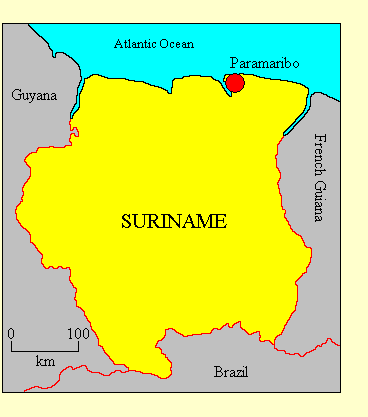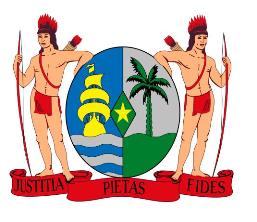

REPUBLIC OF SURINAME
• Official name: Republiek Suriname (Republic of Suriname)
• Location: South America
• International organisations: African, Caribbean and Pacific Group of States, Organisation of American
States, Non-Aligned Movement, Organisation of Islamic Conference, United Nations, World Trade Organisation
• Borders: Brazil, French Guiana, Guyana
• Coastline: South Atlantic Ocean
• Land area: 163,270 Km2
• Population: 480,000
• Annual GDP (PPP) per capita: US$9,000 (2009 CIA estimate). World ranking: 88
• Ethnicity: Suriname is a highly ethnically diverse country. About 30% of the people are of North Indian
descent (known locally as East Indians), about 15% are of Indonesian descent, while 10% are of Black African
origin (known as "Maroons"). About 30% are of mixed race, mainly Creole (mixed African and European). Other
minorities include Amerindians, Chinese and Dutch.
• Languages: Dutch is the official language but is being increasingly displaced in business and media by
English. Most of the people speak a creole called Sranang Tongo or Taki-Taki. Hindi, Javanese and Chinese are
also spoken.
• Religion: Hindu 27.4%, Sunni Muslim 19.6%, Catholic Christian 22.8%, Protestant Christian 25.2%
• Form of government: Presidential democratic republic. Suriname is divided into 10 districts
• Capital: Paramaribo
• Constitution: The
Constitution of Suriname came into effect on 30 September 1987.
• Head of state: The President, chosen by the legislature for a five-year term.
• Head of government: The President, who appoints the members of the Cabinet.
• Legislature: Suriname has a unicameral legislature, the
National Assembly (Nationale Assemblee), which has
51 members elected from multi-member districts for five-year terms.

• Electoral authority: The General
Election Secretariat conducts national elections.
• Freedom House 2009 rating: Political Rights 2, Civil Liberties 2
Political history
The coast of what is now Suriname was sighted by Columbus in 1498, and the area fell within Spain's ambit
claim of the South American mainland, but it did not attract Spanish settlement and the claim was never
enforced. Dutch settlement began in 1616, and the Netherlands formally claimed the area in 1667. In 1804 it was
occupied by Britain, but was returned to the Dutch in 1816, becoming part of the Dutch West Indies in 1828
and the separate colony of Netherlands Guiana in 1848. It was renamed Suriname in 1948 and gained internal
self-government in 1949. The Surinamese were happy with self-government until 1975, when the country became
independent.
Suriname's first government, led by by Henck Arron, was deposed by a military coup in 1980, and
Desi Bouterse ruled as a dictator until 1987, when the constitution was restored. There was a second coup
in 1990, but the following year international pressure led to a return to civilian rule. Since then Suriname
has achieved greater political stability. Political parties are mostly ethnic based. The National Party of
Suriname, which represents the Creoles, is the largest single party and dominates the New Front for Democracy
coalition led by Ronald Venetiaan, who was President 1991-96 and again 2000-10. The main opposition is the
National Democratic Party of former dictator
Desi Bouterse. Following Venetiaan's retirement in 2010,
the National Assembly elected Bouterse president, despite his involvement in political murders during his time as
dictator and his conviction in the Netherlands for drug trafficking.
Freedom House's 2009 report on Suriname
says: "Suriname is an electoral democracy... While no major cases of government corruption were reported in
2008, organized crime and drug networks continue to hamper governance. Suriname was ranked 72 out of 180
countries surveyed in Transparency International's 2008 Corruption Perceptions Index... The constitution
provides for freedom of expression and of the press, and the government generally respects these rights in
practice... Freedoms of assembly and association are provided for in the constitution, and the government respects these rights in practice.
Although civic institutions remain weak, human rights organisations function freely... The judiciary is
susceptible to political influence and suffers from a significant shortage of judges and a large backlog of
cases."
Updated October 2010
|

